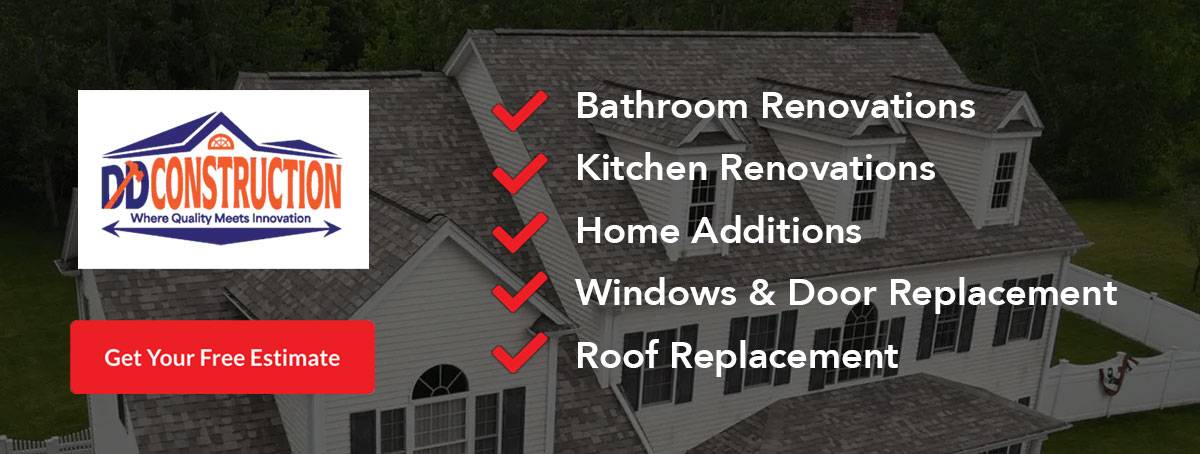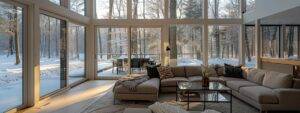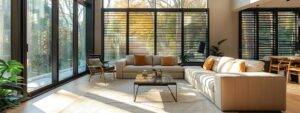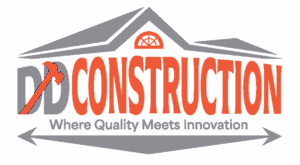Introduction In today’s competitive home improvement market, Massachusetts homeowners are increasingly drawn to modern window styles that combine aesthetic appeal with enhanced energy efficiency. With rising concerns over high energy bills, environmental impact, and overall home comfort, selecting the right windows is a crucial investment in long-term performance and durability. Massachusetts homeowners face unique challenges due to the local climate, ranging from bitterly cold winters to humid summers. The right modern window replacement in Massachusetts can reduce heating costs, minimize greenhouse gas emissions, and boost both curb appeal and property value. dd construction understands that a window replacement project involves strategic decisions in materials, design, and installation techniques that comply with state building codes and local climate requirements.
This article explores contemporary window styles suitable for Massachusetts homes. We cover popular configurations such as casement, double-hung, sliding, picture, bay, bow, awning, and hopper windows. In addition, the article reviews window materials including vinyl, wood, aluminum, fiberglass, and composite options, and discusses energy efficiency features like Low-E glass, argon gas insulation, and ENERGY STAR certifications. Special attention is given to Massachusetts-specific factors such as building codes and installation costs. Finally, readers will learn how to choose the right modern window style for their home and discover essential maintenance tips.
The discussion that follows serves as a comprehensive guide for Massachusetts homeowners seeking quality window replacement services. By integrating expert insights from DD Construction, case studies, and detailed comparisons, this article empowers homeowners to make informed decisions that enhance both the look and energy efficiency of their homes. Whether renovating or building new, understanding modern window features is essential to improving energy savings, reducing noise, and boosting property value. Let’s explore state-of-the-art window designs that meet Massachusetts weather challenges and elevate overall living environments.
What Are the Most Popular Modern Window Styles for Massachusetts Homes?
Modern window design meets both aesthetic and functional demands. Massachusetts homeowners look for windows that enhance curb appeal while offering energy savings, noise reduction, and smooth operation. The styles discussed here feature improved insulation and easy maintenance suited for the local climate.
What Defines Casement Windows and Their Benefits?
Casement windows, hinged on one side, open outward and capture breezes for improved airflow. They offer excellent ventilation and energy efficiency by minimizing gaps and reducing drafts—crucial during cold Massachusetts winters. Their slim frames and large panes provide unobstructed views and a modern aesthetic. These windows are popular for their sleek design, ease of use, robust security, and weather resistance.
How Do Double-Hung Windows Suit Massachusetts Homes?
Double-hung windows feature two vertically moving sashes that provide versatile ventilation. Their design allows superior airflow control while maintaining tight seals to reduce heat loss. The sashes are easily cleaned from inside multi-story residences, and modern versions with Low-E coatings enhance energy efficiency. This balanced design suits both contemporary and traditional homes.
Why Choose Sliding and Picture Windows for Modern Designs?
Sliding windows, which glide horizontally along a track, offer a minimalist look that maximizes natural light and minimizes maintenance. Picture windows, fixed for optimal views, provide excellent thermal performance by reducing air infiltration. Both types create seamless visual connections with the outdoors—ideal for adding a modern touch and energy efficiency to Massachusetts homes.
What Are Bay and Bow Windows and Their Unique Features?
Bay and bow windows extend from the home, creating a shelf that enhances both interior brightness and exterior appeal. Bay windows typically consist of three panels, while bow windows have a curved profile with four or more panels. Both styles increase natural light, add extra living space, and offer decorative interest—especially attractive during short winter days.
How Do Awning and Hopper Windows Enhance Home Functionality?
Awning windows, hinged at the top, open outward to protect from rain while ventilating the room. Hopper windows, hinged at the bottom, open inward and are ideal for basements or tight spaces. Both designs offer efficient operation under varied weather conditions, making them practical choices for spaces where controlled ventilation and moisture resistance are essential.
Which Window Materials Are Best for Modern Styles in Massachusetts?
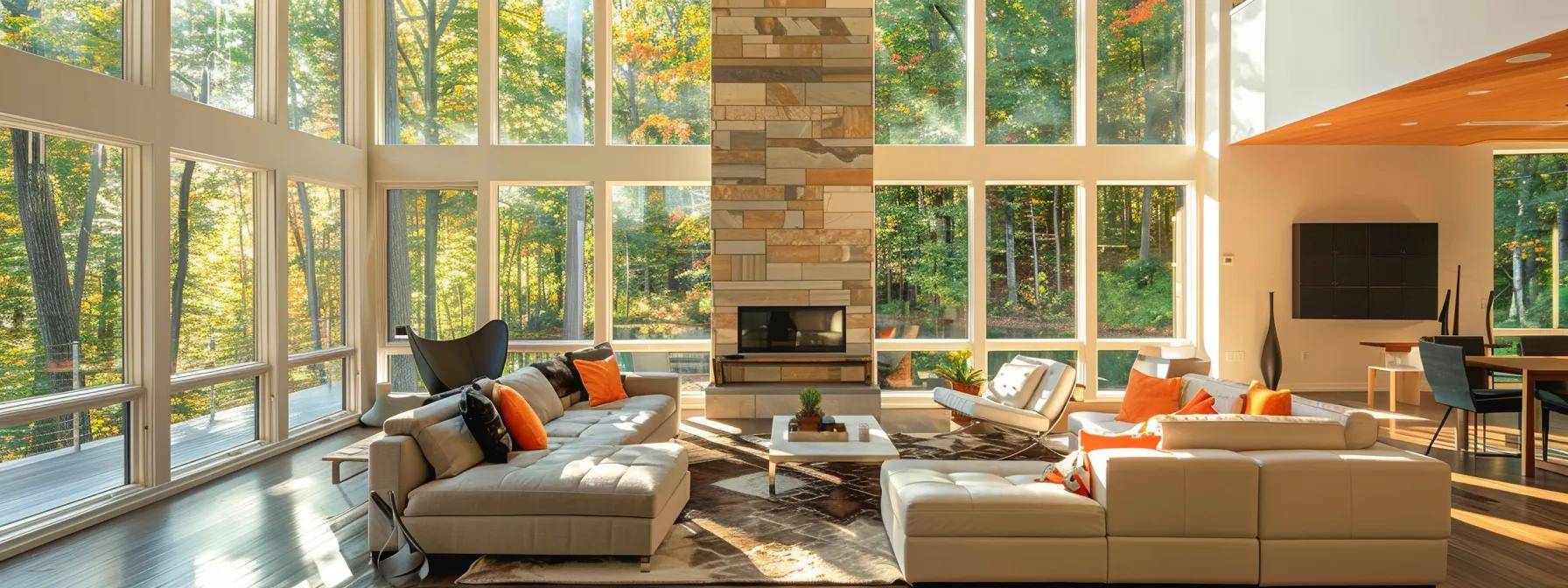
Choosing the right window material is as important as selecting the style. Homeowners must consider energy efficiency, durability, maintenance, and appearance. Vinyl, wood, aluminum, fiberglass, and composite materials each offer unique benefits suited to the extreme weather challenges in Massachusetts.
Why Are Vinyl Windows Popular for Energy Efficiency and Durability?
Vinyl windows are favored for their energy efficiency and low maintenance. Impervious to moisture and rot, vinyl windows offer superior thermal insulation with multi-chambered designs and Low-E coatings that reduce heat loss. Their resistance to fading and low upkeep needs make them cost-effective and visually modern.
What Are the Benefits of Wood and Aluminum Windows in Massachusetts?
Wood windows offer classic warmth and natural beauty, ideal for historic or upscale homes, though they require periodic sealing. Aluminum windows provide strength and slim profiles that support large glass panels for panoramic views. With thermal breaks to improve energy efficiency, aluminum offers durability with minimal maintenance.
How Do Fiberglass and Composite Windows Meet Modern Home Needs?
Fiberglass and composite windows lead modern technology by combining strength with sleek design. Fiberglass withstands temperature extremes without warping, while composite windows offer the attractive look of wood with enhanced durability and low maintenance. Both options deliver excellent energy efficiency with tight seals and advanced glazing.
How Do Window Materials Affect Maintenance and Longevity?
Maintenance needs vary by material. Vinyl requires only occasional cleaning, while wood needs periodic painting or sealing. Aluminum windows demand little upkeep but may need dust removal, and fiberglass as well as composite windows provide a balanced low-maintenance solution. Homeowners should consider initial costs, upkeep routines, and durability when selecting materials.
How Do Energy Efficiency Features Improve Modern Windows in Massachusetts?
Energy efficiency is key in modern window design, especially in Massachusetts where temperature extremes are common. Features like Low-E glass, argon gas fills, and advanced sealing improve thermal performance, lower utility bills, and reduce a home’s carbon footprint while meeting energy standards.
What Is Low-E Glass and How Does It Save Energy?
Low-E glass incorporates a thin, transparent coating that reflects infrared light. It prevents heat loss during winter and minimizes heat gain in summer, maintaining a uniform indoor temperature. This technology can reduce energy consumption by up to 30%, making it a cost-effective and sustainable window solution.
How Does Argon Gas Enhance Window Insulation?
Argon gas, used between panes in multi-glazed windows, reduces heat transfer due to its low thermal conductivity. It maintains stable indoor temperatures during harsh winters and hot summers, allowing heating and cooling systems to operate more efficiently, which lowers energy costs.
Why Choose ENERGY STAR Certified Windows for Massachusetts Homes?
ENERGY STAR certified windows meet high energy efficiency standards set by the EPA and DOE. Their advanced insulating materials reduce heating and cooling demands, resulting in lower energy bills and reduced greenhouse gas emissions. This certification gives homeowners confidence in their window replacement investment.
How Do Window Insulation and UV Protection Impact Comfort?
High-quality insulation minimizes air leakage, stabilizing indoor temperatures. UV protection, provided by specialized coatings, prevents fading of interiors. Combined, these features ensure continuous comfort and preservation of furnishings, while contributing to energy savings and reduced glare.
What Massachusetts-Specific Factors Affect Modern Window Selection?
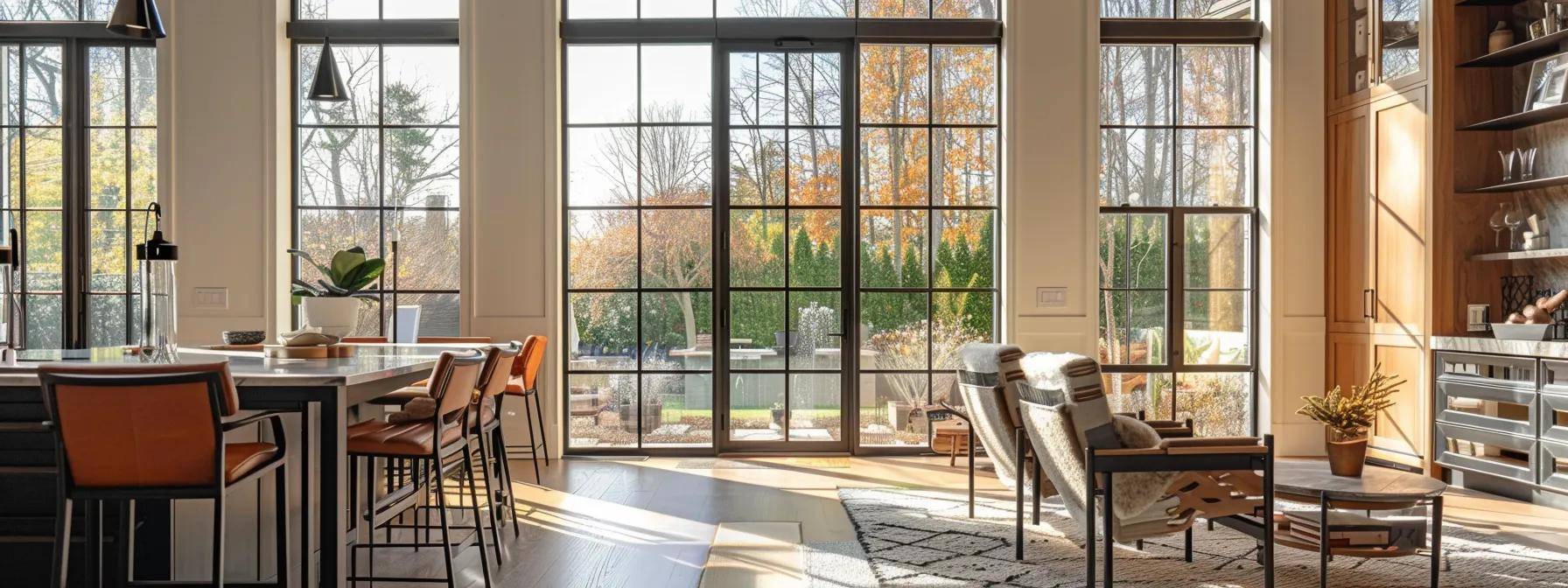
Massachusetts homeowners must consider local weather, building codes, and available installation services when choosing windows. The state’s conditions—from heavy snow to humid summers—require windows with robust insulation, durability, and secure performance. Local regulations also shape material and design choices.
What Are the Massachusetts Building Codes for Window Replacement?
Local building codes require strict compliance in safety, energy efficiency, and performance. Codes specify minimum insulation values, air leakage tolerances, and the use of ENERGY STAR rated windows. Working with certified professionals ensures installations meet these standards, protecting homeowners’ investments.
How Does Massachusetts Climate Influence Window Style and Material Choices?
The severe winters, hot summers, and variable precipitation in Massachusetts dictate window performance. Materials like fiberglass, composite, and high-grade vinyl are preferred for their durability and resistance to warping. Designs that offer tight seals and enhanced structural integrity help reduce drafts and heating costs.
Where Can You Find Professional Window Installation Services in Massachusetts?
Reputable contractors like DD Construction offer comprehensive window replacement services, including consultation, product selection, and expert installation. Local expertise ensures installations are precise, energy-efficient, and compliant with building codes, often including inspections and warranties for extra peace of mind.
How Much Does Window Replacement Cost in Massachusetts?
Window replacement costs in Massachusetts depend on window type, materials, energy efficiency features, and installation fees. High-quality windows with advanced insulation may have a higher upfront cost but offer long-term savings through reduced energy bills and increased home value. Homeowners are encouraged to obtain multiple quotes and consider available rebates or tax credits.
How to Choose the Right Modern Window Style for Your Massachusetts Home?
Choosing the right modern window style involves evaluating aesthetic preferences, energy efficiency, budget constraints, and installation requirements. Massachusetts homeowners must balance these factors to select windows that complement their home’s architecture and perform well under local climate challenges.
What Factors Should You Consider When Selecting Window Styles?
Key factors include energy efficiency, which reduces heating and cooling losses; aesthetic impact, whether you prefer the sleek look of sliding or the traditional charm of bay windows; and durability, maintenance, security, and noise reduction. Consulting experts and reviewing customer testimonials can help ensure the chosen style meets both functional and design needs.
How Do Window Features Like Soundproofing and Hardware Enhance Your Choice?
Soundproofing and advanced hardware enhance window performance by reducing external noise and ensuring smooth operation and security. Laminated glass, secure locking systems, and energy-efficient frames contribute to longevity while lowering maintenance needs. These features improve comfort and value, providing a quieter, safer home environment.
Why Is Professional Installation Critical for Modern Windows?
Proper installation is essential for energy efficiency and preventing issues like drafts and water leakage. Professionals ensure windows are correctly fitted and sealed, complying with building codes. This careful installation maximizes performance, extends window life, and protects your investment through warranty support.
How Can Customer Reviews and Testimonials Help Your Decision?
Customer reviews provide real-world insights into energy savings, durability, and installation quality. Feedback from local Massachusetts residents helps assess whether a specific style or installer meets expectations and offers reliable performance under local weather conditions.
What Are the Benefits of Modern Window Styles for Massachusetts Homeowners?
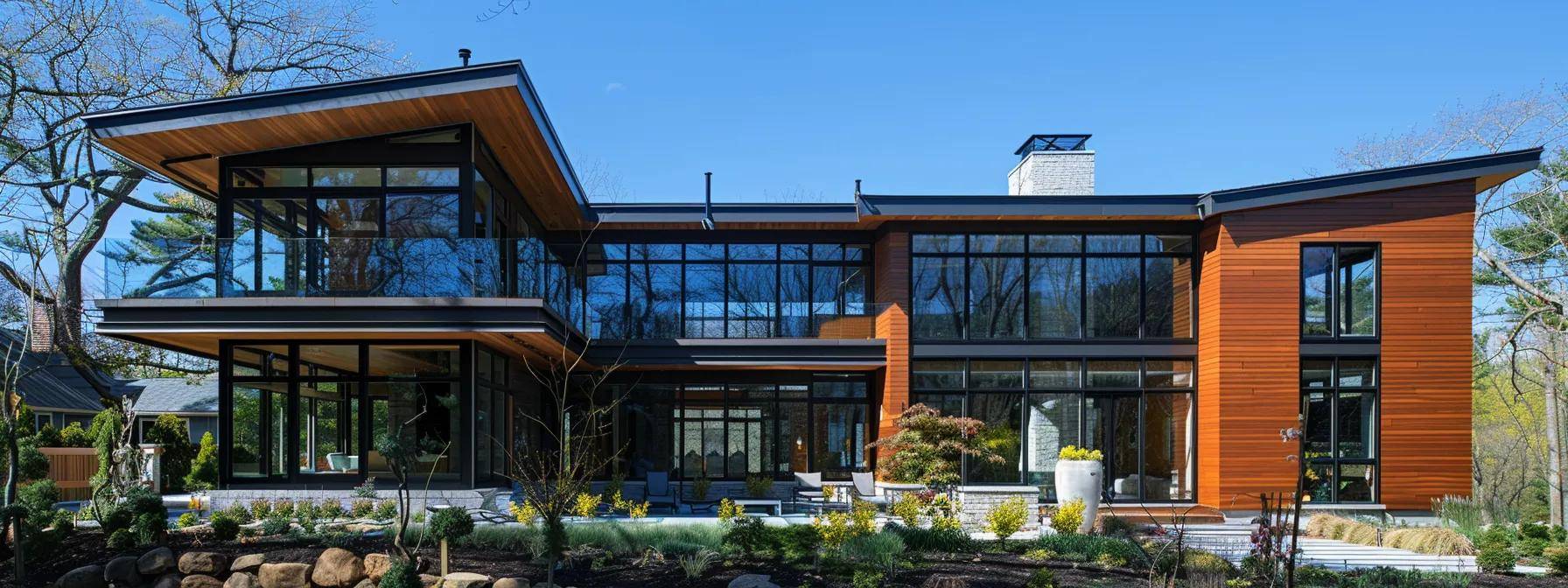
Modern window styles deliver numerous benefits including enhanced energy efficiency, indoor comfort, home value, and environmental impact through reduced greenhouse gas emissions. They offer superior thermal performance and a modern aesthetic that boosts curb appeal while reducing noise and ultraviolet damage.
How Do Modern Windows Increase Home Value and Curb Appeal?
Modern windows add significant market value by enhancing a home’s appearance and energy efficiency. Their sleek designs, along with features like bay or bow configurations, attract prospective buyers who value long-term savings and low maintenance costs.
In What Ways Do Modern Windows Improve Energy Savings and Comfort?
Advanced window technologies minimize heat transfer with features like Low-E glass and argon insulation. This results in stable indoor temperatures, reduced energy bills, and improved comfort by limiting drafts and maintaining consistent heating and cooling.
How Do Modern Windows Reduce Noise and Enhance Privacy?
With multi-pane glazing and tighter seals, modern windows significantly block external noise and ensure enhanced privacy. Thicker glass and improved design reduce sound infiltration and provide clear views, fostering a peaceful indoor environment ideal for relaxation.
What Environmental Benefits Do Energy-Efficient Windows Provide?
Energy-efficient windows lower overall energy consumption by reducing the need for heating and cooling. This decrease in energy demand helps limit fossil fuel use and greenhouse gas emissions, contributing to broader sustainability goals while reducing long-term energy costs.
How Can You Maintain and Care for Modern Windows in Massachusetts?
Proper maintenance ensures modern windows perform optimally over time. Regular cleaning, inspections, and prompt repairs prevent minor issues from becoming major problems, preserving both energy efficiency and aesthetics.
What Are Best Practices for Cleaning and Maintenance?
Clean windows at least twice yearly with non-abrasive solutions and soft cloths. For vinyl, fiberglass, or composite frames, avoid harsh chemicals. Regularly inspect for gaps or condensation which may indicate sealing issues to keep components operating efficiently.
When Should You Schedule Window Inspections or Repairs?
Annual inspections are recommended, with additional checks after severe weather. Early detection of issues like cracked glass or warped frames helps prevent costly repairs. Many professionals, such as DD Construction, offer routine inspections as part of their service package.
How Do Material Types Affect Maintenance Requirements?
Maintenance varies by material; vinyl needs minimal cleaning, wood requires periodic sealing or repainting, and aluminum may need regular dusting. Fiberglass and composite windows strike a balance between appearance and ease of upkeep. Choose a material that fits your maintenance routine and lifestyle.
What Warranty and Support Options Are Available for Modern Windows?
Modern windows are backed by warranties covering material defects, installation issues, and performance criteria. Reputable brands like Andersen, Pella, or Marvin often offer 10-to-30-year warranties. Professional installation services frequently include post-installation support and inspections to ensure lasting performance.
Frequently Asked Questions
Q: How do modern windows help save energy in Massachusetts homes? A: Modern windows incorporate advanced features such as Low-E glass, argon gas insulation, and optimized frames to minimize heat transfer, stabilize indoor temperatures, and reduce energy bills. ENERGY STAR certification further confirms their high efficiency.
Q: What types of window styles are most popular in Massachusetts? A: Popular styles include casement windows for ventilation, double-hung windows for versatile operation, sliding and picture windows for expansive views, and bay, bow, awning, and hopper windows for added space and functionality.
Q: Are vinyl windows a good choice for the harsh Massachusetts climate? A: Yes, vinyl windows are favored for their energy efficiency, durability, low maintenance, and resistance to moisture, rot, and fading, making them highly suitable for extreme weather.
Q: How often should I have my windows inspected or maintained? A: Annual inspections are recommended, with extra checks after severe weather. Routine cleaning and professional inspections help extend window life and maintain efficiency.
Q: What financing or rebate options are available for window replacement projects in Massachusetts? A: Many projects qualify for energy efficiency rebates, tax credits, and financing through programs like Mass Save. ENERGY STAR certified windows may also qualify for additional incentives.
Q: Do modern windows require a lot of maintenance compared to older styles? A: Modern windows are engineered for low maintenance. Vinyl, fiberglass, and composite models require minimal upkeep compared to traditional wood windows that may need regular repainting or sealing.
Q: How do window replacement costs in Massachusetts compare with energy savings over time? A: Although modern windows may have a higher initial cost, long-term energy savings, improved home comfort, and increased property value often justify the investment, especially with available state rebates and tax credits.
| Window Feature | Benefit | Key Component | Impact on Home |
|---|---|---|---|
| Low-E Glass | Reduces heat loss/gain | Thin metallic coating | Improves energy efficiency, lowering utility bills |
| Argon Gas Insulation | Minimizes thermal transfer | Inert argon gas fill | Enhances window insulation in extreme climates |
| ENERGY STAR Certification | Ensures high energy efficiency | Verified performance ratings | Reduces energy consumption and greenhouse gas emissions |
| Multi-chambered Frames | Enhances durability and strength | Internal frame design | Provides structural integrity and thermal performance |
| UV Protection | Prevents fading of interiors | Special glass coatings | Maintains interior aesthetics and protects furnishings |
| Secure Locking System | Enhances home security | Advanced hardware | Prevents drafts and improves overall safety |
| Weatherproof Seals | Reduces air and moisture infiltration | High-quality gasket material | Improves thermal performance and extends window lifespan |
Before selecting new windows for your Massachusetts home, reviewing a detailed comparison table like the one above can help you identify which features best meet your needs. This table demonstrates how modern window technologies integrate to improve energy savings, security, and longevity.
| Material | Maintenance Level | Energy Efficiency | Durability | Aesthetic Appeal |
|---|---|---|---|---|
| Vinyl | Low | High | High | Modern, sleek |
| Wood | High | Moderate | Moderate | Classic, warm |
| Aluminum | Low | Moderate | High | Slim, contemporary |
| Fiberglass | Low | High | Very High | Versatile |
| Composite | Moderate | High | High | Natural look |
| Modern Glass | Low | Very High | High | Expansive views |
| Thermal Breaks | Low | Very High | High | Transparent, clean |
A supplementary table like the one above compares material options based on maintenance, energy efficiency, durability, and aesthetics. Understanding these comparisons assists Massachusetts homeowners in choosing the best option for both performance and appearance.
Overall, modern window styles and materials are designed to meet the specific challenges of Massachusetts weather. With improved energy efficiency, superior noise insulation, and low maintenance demands, these windows are a practical and attractive home improvement option. By evaluating both style and function—and considering local climate and building requirements—homeowners can significantly enhance their home’s performance, comfort, and value.

